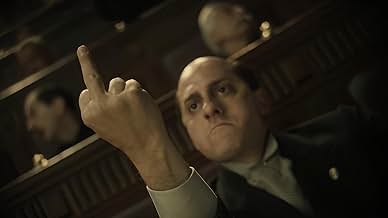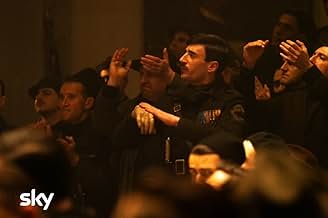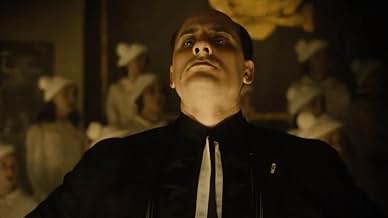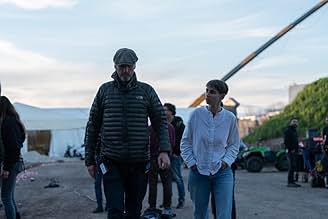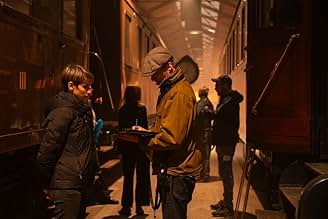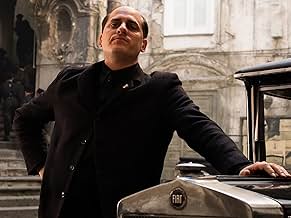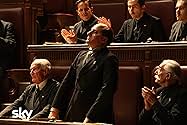M: Il figlio del secolo
- टीवी मिनी सीरीज़
- 2024–2025
- 52 मि
अपनी भाषा में प्लॉट जोड़ेंBenito Mussolini's early career from his founding of the Fasci Italiani in 1919 up to the assassination of socialist politician Giacomo Matteotti in 1924 and his speech in Parliament on 3 Ja... सभी पढ़ेंBenito Mussolini's early career from his founding of the Fasci Italiani in 1919 up to the assassination of socialist politician Giacomo Matteotti in 1924 and his speech in Parliament on 3 January 1925.Benito Mussolini's early career from his founding of the Fasci Italiani in 1919 up to the assassination of socialist politician Giacomo Matteotti in 1924 and his speech in Parliament on 3 January 1925.
- पुरस्कार
- कुल 2 जीत
एपिसोड ब्राउज़ करें
फ़ीचर्ड समीक्षाएं
The english subtitles are a disaster. They look like automated translations not reviewed by someone who understand italian. For example "Margarita" (the name of a woman) is translated as "margarita pizza". Or "No, no" is translated "ninth", because in italian "nono" means "ninth".
Sometimes these bugs don't help comprehension. They mix up pronouns: "They kick it out" instead of "They kick him out". They don't take into account the formal you that in italian is she. For some complex sentences there is no analysis done by a human : "his husband".
An amateur job done by incompetents.
Such a magnificent work deserves better.
Sometimes these bugs don't help comprehension. They mix up pronouns: "They kick it out" instead of "They kick him out". They don't take into account the formal you that in italian is she. For some complex sentences there is no analysis done by a human : "his husband".
An amateur job done by incompetents.
Such a magnificent work deserves better.
The film presents the beginnings of Benito Musollini's political career. But to a greater extent it is a study of the creation of a dictatorship. And this is a universal and timeless phenomenon.
What is unusual is the form, which may put off some viewers. The main character often speaks directly to the audience, presents his thoughts and comments on the events taking place, sometimes these allusions are current, e.g. In episode four when he says the slogan MIGA (you will understand when you see it). It is a really great scene.
The film is also quite baroque, at times surreal.
The acting makes a great impression. Luca Marinelli (Musollini) behaves on screen like his prototype. If you know the history and have seen Mussolini's grotesque speeches, you can imagine that this required great skills. Other roles, although episodic, are also worth attention. For example, Benedetta Cimatti is great as the suppressed wife of the Duce.
Due to the specific form of the film, some viewers may be put off by it.
But it's a very good movie.
What is unusual is the form, which may put off some viewers. The main character often speaks directly to the audience, presents his thoughts and comments on the events taking place, sometimes these allusions are current, e.g. In episode four when he says the slogan MIGA (you will understand when you see it). It is a really great scene.
The film is also quite baroque, at times surreal.
The acting makes a great impression. Luca Marinelli (Musollini) behaves on screen like his prototype. If you know the history and have seen Mussolini's grotesque speeches, you can imagine that this required great skills. Other roles, although episodic, are also worth attention. For example, Benedetta Cimatti is great as the suppressed wife of the Duce.
Due to the specific form of the film, some viewers may be put off by it.
But it's a very good movie.
While the cinematography is out for everyone to appreciate, I feel a need to stress a couple of key points international audiences might miss.
First and foremost: the series is based on the first of four books about the life of Mussolini, and while they are routinely described as "novels", they are in fact impressively researched from a historical point. Pretty much every dialogue, speech, document and event are openly sourced and beyond question.
While the staging frequently and blatantly is not realistic in order to make the show more spectacular, pretty much everything happened as you see it - including a D'Annunzio's Japanese samurai secretary and other apparently absurd elements.
My second point is about the acting and language. While it will fly above the heads of anyone not _very_ experienced with Italian, the work behind regional accents, lapses into dialects and the very speech patterns of 100 years ago is exceptional indeed. It is a shame this will mostly go unnoticed, as it actually conveys a fair bit of refinement to an already stellar ensemble performance.
Lastly, the (not present in the books) stabs at current politics are far more varied than expected. Like, everyone can understand a sudden fourth-wall-breaking "Make Italy Great Again!", but you'll probably miss the reference to the catastrophic Berlusconi era (delivered via subtle voice and body acting, or even just a brief costume change), or to the sorry state of the last few recent Italian legislatures.
In short: come for the show, stay for the history lesson... and see it with an Italian resident if you can to enjoy it at its fullest.
First and foremost: the series is based on the first of four books about the life of Mussolini, and while they are routinely described as "novels", they are in fact impressively researched from a historical point. Pretty much every dialogue, speech, document and event are openly sourced and beyond question.
While the staging frequently and blatantly is not realistic in order to make the show more spectacular, pretty much everything happened as you see it - including a D'Annunzio's Japanese samurai secretary and other apparently absurd elements.
My second point is about the acting and language. While it will fly above the heads of anyone not _very_ experienced with Italian, the work behind regional accents, lapses into dialects and the very speech patterns of 100 years ago is exceptional indeed. It is a shame this will mostly go unnoticed, as it actually conveys a fair bit of refinement to an already stellar ensemble performance.
Lastly, the (not present in the books) stabs at current politics are far more varied than expected. Like, everyone can understand a sudden fourth-wall-breaking "Make Italy Great Again!", but you'll probably miss the reference to the catastrophic Berlusconi era (delivered via subtle voice and body acting, or even just a brief costume change), or to the sorry state of the last few recent Italian legislatures.
In short: come for the show, stay for the history lesson... and see it with an Italian resident if you can to enjoy it at its fullest.
Compelling plot, striking photography, excellent acting by Marinelli. Above all, a solid portrayal of a particular historical period.
Much more to be appreciated if you speak Italian, because Marinelli's performance is truly a masterpiece, both from a linguistic and human point of view. M is a winning example of how history should be represented in cinema: hard and raw, without unnecessary words or unnecessary events based on fiction.
I really recommend its viewing. However, do not expect a simple and straightforward viewing; the story is purely described, there is no shortage of harsh scenes and I felt like some stories missed some details.
What is interesting is that the meaning of some of the pictures goes beyond the simple political figure to the man, with his fears and weaknesses. Things that, of the figure of Mussolini, never really came out of that period.
Excellent cinematic work.
Much more to be appreciated if you speak Italian, because Marinelli's performance is truly a masterpiece, both from a linguistic and human point of view. M is a winning example of how history should be represented in cinema: hard and raw, without unnecessary words or unnecessary events based on fiction.
I really recommend its viewing. However, do not expect a simple and straightforward viewing; the story is purely described, there is no shortage of harsh scenes and I felt like some stories missed some details.
What is interesting is that the meaning of some of the pictures goes beyond the simple political figure to the man, with his fears and weaknesses. Things that, of the figure of Mussolini, never really came out of that period.
Excellent cinematic work.
For those who have any interest in history, politics, and lessons on human nature, this is the show for you. Seeing the rise of Mussolini in such a way - with Luca Marinelli frequently breaking the fourth wall to speak to us, his audience - keeps it captivating and really holds up to the meta spectacle of his character. Despite the seriousness of the topic, the biting sarcasm and amusing moments keep it entertaining, too. Of course, for anyone who's been following the recent global rise in certain political trends, they'll undoubtedly feel a little uneasy when recognizing the patterns in today's day and age. An impressive production, Luca Marinelli's portrayal of the famous Italian dictator is downright stupendous. A wholehearted recommendation to watch and be amazed by M - Son of the Century.
क्या आपको पता है
- ट्रिवियाWhen Joe Wright got on board as director, at first he meant to have the actors say their lines in English. Then he changed his mind and chose to shoot the series in Italian, for a higher immediacy.
टॉप पसंद
रेटिंग देने के लिए साइन-इन करें और वैयक्तिकृत सुझावों के लिए वॉचलिस्ट करें
- How many seasons does Mussolini: Son of the Century have?Alexa द्वारा संचालित
विवरण
- रिलीज़ की तारीख़
- कंट्री ऑफ़ ओरिजिन
- आधिकारिक साइट
- भाषा
- इस रूप में भी जाना जाता है
- Mussolini: Son of the Century
- फ़िल्माने की जगहें
- उत्पादन कंपनियां
- IMDbPro पर और कंपनी क्रेडिट देखें
- चलने की अवधि
- 52 मि
- रंग
इस पेज में योगदान दें
किसी बदलाव का सुझाव दें या अनुपलब्ध कॉन्टेंट जोड़ें

![Trailer Season 1 [OV] देखें](https://m.media-amazon.com/images/M/MV5BYWM4MjYyMDktOWQwNy00NzNlLTg0OGUtZjk5Yzk0MjA2YmNlXkEyXkFqcGdeQXRyYW5zY29kZS13b3JrZmxvdw@@._V1_QL75_UX500_CR0)
